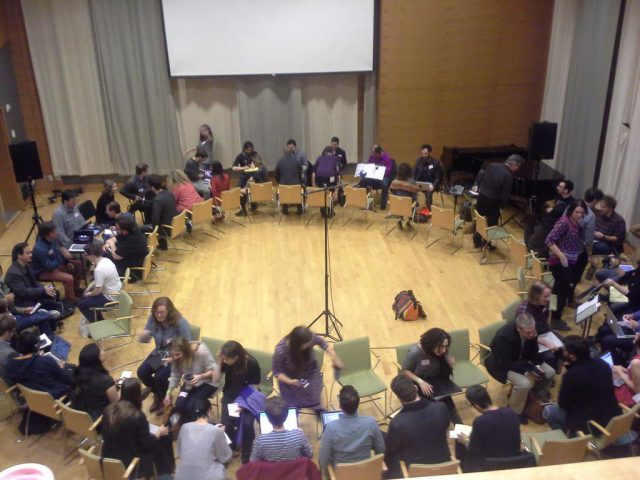
From January 15-17, 2015 New Music Gathering took place at the San Francisco Conservatory of Music. Performers, composers, educators, administrators and fans gathered to discuss everything from engaging the community to the economics of the industry to where to go for the best burrito in the Mission District.
I arrived Friday evening after much of the first day activities (which included what I heard was a fantastic key note address by Claire Chase), but still managed to see and participate in an incredible number of discussions and performances.
Stories of Established Ensembles
The first event I was able to catch was an evening panel discussion entitled “Stories of Established Ensembles”; Sidney Chen and Christina Johnson (of the Kronos Performing Arts Association), Claire Chase (of ICE), and Gavin Chuck and Matt Marks (of Alarm Will Sound) were on stage. Matt moderated the conversation. They each told a bit of the histories of their ensembles and where they are today.
– Alarm Will Sound arose from OSSIA, a student ensemble that Gavin Chuck and Alan Pierson, along with four others, put together at the Eastman School of Music. After completing their degrees they wanted to continue putting together adventurous programs with the people from that group. They also saw a gap in the United States: most every country in Europe has an ensemble devoted to contemporary music. There was no such group in the US.
– ICE came from a proposal Claire Chase made while at Oberlin. From what I understood of her explanation: She formed the idea for a concert event that included educational elements, live performance and recordings. She was told that she should trim back the vision and propose just one thing. “I couldn’t imagine it not being everything.” So she made her proposal as she had originally envisioned and began the mission of ICE.
– Kronos started when David Harrington heard George Crumb’s Black Angels and decided he wanted to play it. He found three other musicians. They moved from Seattle to San Francisco. Sidney talked about the group considering a move to NYC from time to time but always electing to stay in SF because it was part of who they are.
AWS and ICE talked about their current projects: Alarm Will Sound – Alarm System; ICE – OpenICE. There was a question from the audience about the best way to teach entrepreneurship in a college environment. It seemed everyone agreed with Gavin’s answer of “practicum.” “Require students to stage an event, including obtaining equipment and space.” Sidney added, “and give them a budget!”
Composer/Performer Speed Dating
"RT @kevinefclark Composer performer speed dating. Brilliant. #NMG2015 pic.twitter.com/9zZcu6WgmB" Such a great idea. @NewMusGathering
— Brian Lawlor (@brianlawlored) January 16, 2015
The next event I caught was the morning “Composer/Performer Speed Date.” Great idea, great experience. Composers sat in a circle facing in, performers sat facing them. Performers would rotate every three minutes. It was a great way to make contact and learn a little about one another which may lead to some possible collaborations. I didn’t get to meet everyone in the room (there wasn’t enough time with only three minutes per composer) but I did get to see Ryan Ross Smith’s work with animated notation and get to hear some music of Bill Susman who’s work with the Octet Ensemble is getting some well-deserved recognition.
Education Discussion
Daniel Felsenfeld, Kate Sheeran, Brenna Noonan, Pamela Stein and Dan Becker participated in a panel discussion regarding education. They talked about their programs and who they engage. Kate (of the New School at Mannes) talked about The New School Chorus, a community choir that does repertoire from Western choral masterpieces to Eastern European folk singing, classic American jazz and popular song to traditional music. Daniel discussed the NY Philharmonics’ Very Young Composer program which gives students, grades 3-5, the opportunity to write music.
The tendency for students to hide their taste for pop music also came up. Kate remarked how it’s funny how a high school age student will be playing their favorite song from the radio on the piano but immediately stop when a teacher walked past. Where was this hesitancy born? The “stodginess” of teachers? There was general agreement that schools could be more open to all styles.
A Rising Tide: Using Social Media to Grow a Global Audience for New Music

I then gave a presentation on using social media from within a performer-led ensemble and how we as a “new music” community could use social media to grow an audience for all of us. The crux of it: talk about things other than ourselves to get people interested, use the networks with some knowledge of how they operate, celebrate contemporary music as an experience and market that. There was more and there were good questions from those in attendance including Annie Phillips and Matt Marks.
Concert: Joo Won Park
Then I saw a fantastic performance by Joo Won Park. The composer/performer used everything from legos to chains to squeaky toys to a melodica and much more, all routed through SuperCollider to create a fantastic sound experience. The music was varied with moments of serene peacefulness and moments of near overwhelming tension. His pieces incorporated video from time to time, at times showing a closeup of how he was manipulating the objects in front of him, sometimes showing a city skyline with traffic in fast-motion through the course of the day (that image was overlaid with others, creating a dreamy/hallucinogenic effect).
New Music USA and Curing Baumol’s Cost Disease
I arrived late to Kevin Clark’s packed talk. When I entered someone was asking, “so what do we do if the robots take over all the jobs?” Apparently Kevin was discussing the increasing automation (and cost reduction) of certain jobs in the music business (recording, publishing, PR). The discussion was a lively one with questions about “is there such thing as too much new music?” and Eve Beglarian drawing a diagram showing what she sees to be the principle aspects of the performers’ and composers’ jobs:
 She points out the similarities between what each must do and how that “Book” and “Promote” portion of the jobs is the domain of the larger, established corporations. They have connections and distribution.
She points out the similarities between what each must do and how that “Book” and “Promote” portion of the jobs is the domain of the larger, established corporations. They have connections and distribution.
All-in-all it was a far-reaching, engrossing discourse. Cut short, like many of the events of the week, by not enough time.
Unfortunately I had to depart after that missing the panel discussions on women in music, technology and community engagement.



